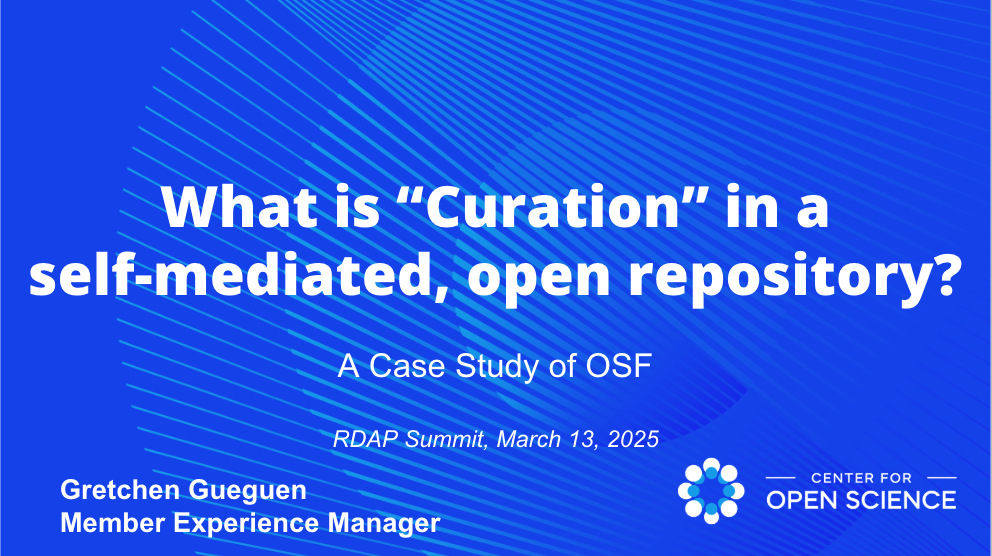
On March 13, 2025, I gave a presentation at a session of the annual RDAP Summit titled “What is ‘Curation’ in a self-mediated, open repository. A Case Study of OSF.” Many repositories that researchers rely on are open platforms, not tied to particular institutions. When valuable curation activities are tied to institutional data curators, how can the important research materials in these repositories be curated? The following is part one of a two-part summary of the talk. Slides can be found at: https://osf.io/yhtns. This post will be updated if and when video from the session becomes available.
The Center for Open Science (COS) is a non-profit based in the US, with a mission to increase openness, integrity, and reproducibility of research. The Open Science Framework (OSF) is a free open source online research platform designed by COS to support researchers in openly and transparently sharing their work at all stages of the research lifecycle.
This presentation will explore how OSF attempted to grapple with the need for more and increasingly flexible curation of content at a very large scale in a generalist repository free for anyone in the world to use. Through partnerships with research and education institutions, OSF investigated tools, interfaces, and services that would facilitate and increase collaboration between curatorial staff and individual researchers.
OSF is a unique research tool: part collaboration space, part data repository, part publishing platform. It is completely free to use and does not require fees for standard storage amounts or subscription through an institution. On OSF the researcher has the following responsibilities and benefits:
Despite being designed for individual researchers, OSF is inherently collaborative in nature: content can be added by all contributors to an OSF project space, can be linked to from other storage locations, and can continue to be added, edited, and changed over time. The researcher-focused nature of OSF gives the user maximum freedom in their sharing. However, as an open repository, valuable activities that enhance FAIR data sharing like data curation are the responsibility of individuals, not the mandate of any single institution with resources for support.
In order to assist institutions in research management, OSF implemented an institutional affiliation program, OSF Institutions, starting in 2020. It is based on providing affiliation to an institution to the user’s content. The name of the institution and its Research Organization Registry (ROR) identifier can be added to metadata for anything an affiliated user creates, if they can verify their membership through institutional authentication. Once content is identified as belonging to the institution, it can then be aggregated for public sharing and metrics can be provided to institutions.
Unlike many institutional repositories, however, membership does not confer to the institution any administrative rights or license to affiliated data. Those rights are retained by the researcher. Institutional membership, or the termination of it, does not impact the researcher’s access to the platform or the availability of content. Other open generalist repositories rely on the same kind of collaboration, but they may tie the researcher more closely to the institution, or may give the institution more administrative control. With OSF, the researcher is independent and they can use it while affiliated with multiple institutions, or as they move from institution to institution.
This operating model requires collaboration between the three entities: OSF, users, and institutions. Users see the advantage of using a large, open generalist repository for research sharing, but institutional services and support need to be proactively sought out.

Beginning in 2022, COS hired a product owner to concentrate primarily on the OSF Institutions program. In addition to providing support to members, an early goal was set to explore ways to make membership more valuable and to increase the collaboration between the three participating entities: OSF, the researcher, and the institution.
A series of informal research activities were undertaken to investigate what could be done without fundamentally changing the model of researcher ownership. An early working group was convened to explore members’ conception of OSF in the landscape of research support tools, in addition to numerous informal conversations with members in support of their service needs.
Initial findings from this period included:
The initial working group was followed by several service improvements including quarterly metrics reports, and a refresh to the online support documentation offered for members.
A Technology Advisory Working Group was formed in 2024 to recommend feature updates for OSF that would increase the institution’s ability to understand and interact with their users. A series of semi-structured interviews at the end of 2024 further informed future goals.
End of part one ... Read part two to find out how we attempted to address the issues we discovered.

6218 Georgia Avenue NW, Suite #1, Unit 3189
Washington, DC 20011
Email: contact@cos.io

Unless otherwise noted, this site is licensed under a Creative Commons Attribution 4.0 International (CC BY 4.0) License.
Responsible stewards of your support
COS has earned top recognition from Charity Navigator and Candid (formerly GuideStar) for our financial transparency and accountability to our mission. COS and the OSF were also awarded SOC2 accreditation in 2023 after an independent assessment of our security and procedures by the American Institute of CPAs (AICPA).
We invite all of our sponsors, partners, and members of the community to learn more about how our organization operates, our impact, our financial performance, and our nonprofit status.